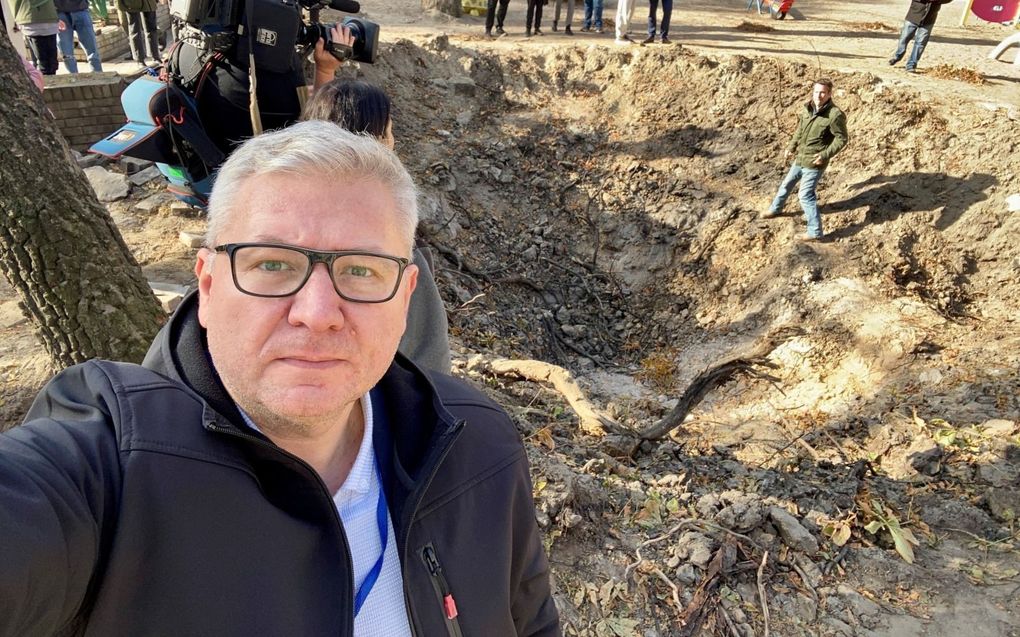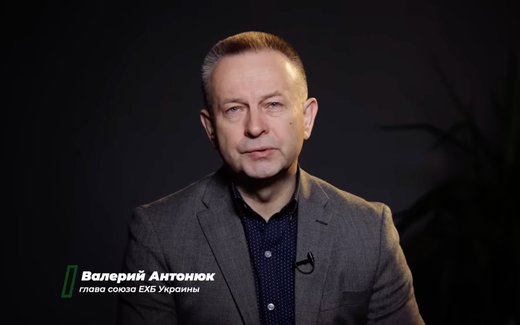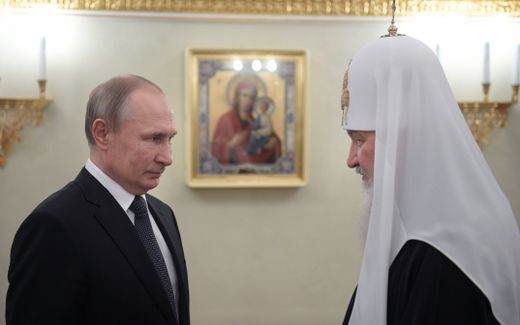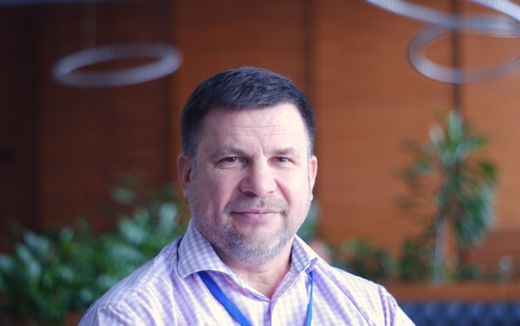Kyiv's break from war is over
18-10-2022
Eastern Europe
Mark Wallet, RD

Sergei Nakul at the spot where a playground used to be before it was hit by a Russian missile. Photo Sergei Nakul
Eastern Europe
Rockets hit Kyiv for the first time in months. Review of turbulent weeks with a pastor in the Ukrainian capital and a teacher in an officially annexed region.
The war has been a distant reality for many Kyiv residents in recent months: the last attack on the Ukrainian capital was in June. But since last week Monday, the unrest has returned.
Reverend Sergei Nakul stood near the crater that a Russian missile struck in a playground in central Kyiv shortly before. "We often came there with our children," he said by phone from the city. "What possesses Russia to bring down a missile worth hundreds of thousands of euros in a military-strategic place like a playground?"
The chances of the missile 'accidentally' hitting a playground are slim, in Nakul's opinion. "None of the targets hit in Kyiv on Monday can be classified as strategic. Several museums were hit, even one with Russian art. Moscow wants to scare us. But they are achieving the opposite. We are all the more determined to resist."
Meanwhile, the attacks undeniably bring unrest. "It has been quiet in the city over the past few days in the sense that there has been no further shelling. But inside, we are restless. Nobody knows what is coming next. There is a strong sense that we could be hit just like that. A colleague of mine was standing at that spot five minutes before the missile strike at the playground. That's intense."
Nuclear attacks
The pastor of Big City Presbyterian Church in the Ukrainian capital was not really surprised by the rocket attacks. "We know we can expect anything from those guys by now," he said scornfully. "We are counting on nuclear attacks. In that respect, these missiles were not so bad. That's kind of the sentiment here."
Nakul says he recognises the pattern of senseless destruction by the Russians. As a volunteer, he helps to rebuild villages around Kyiv that were under fire at the beginning of the war. "There, 60 to 70 per cent of houses have been destroyed," he says.
A team from several Kyiv churches is helping people return to their homes to rebuild or possibly install a mobile home for the winter. "There are older people living in the basement because the house is in ruins. That is obviously not possible in the winter months." Some people leave their destroyed houses for now but are already using their plots of land to grow vegetables and potatoes. Nakul and his team then help with clearing the debris.
Daily life in Kyiv has resumed its ordinary course as much as possible since last week Monday. Schools are primarily closed, but that is nothing new. "Most are functioning online. But ordinary citizens have to go back to work. We cannot hide for days."
Of his congregation, about 50 per cent are in the city, he estimates. The remaining members reside elsewhere. "We do keep in touch with them," Nakul said. "I speak daily to members who have fled." Smiling: "We do house visitation of church members through Zoom. Pastoral care is especially important for them too now." His own family fled as well and now stays in the Netherlands.
Full of hope
The pastor has the impression that the faith of many of his church members has become stronger rather than less because of the war. "We are deeply imbued with the fact that Jesus is always with us, even when we go through a valley of shadows of death, as Psalm 23 says. The nearness of God is for me now a sometimes almost physical experience; I have never experienced that so intensely before."
Living in wartime is uncertain, but that is not the only thing to say about it as far as the preacher is concerned. "I don't know the future, but I do know that God holds it in His hand. That is a precious realisation in this time of war. Question and answer 1 of the Heidelberg Catechism have become very important to me: in life and death, I am Christ's property."
"Our old village is devastated and empty"
Russia recently illegally annexed four Ukrainian regions, but not all parts of them are actually under Russian control. Ukrainian Darina Safrihina travels around an unoccupied part of Donetsk to assist displaced people and those left behind.
Darina Safrihina lives in Myrnohrad, an old mining town in the western Ukrainian region of Donetsk. Even though Russian President Vladimir Putin annexed this region a few weeks ago, there is no trace of Russians in this place.

"This part of Donetsk has never been occupied," Safrikina said by phone from the Ukrainian city. When pro-Russian separatists organised an unofficial independence referendum in Donetsk in 2014, Myrnohrad residents were already keeping away. According to figures from 2001, roughly a third of the approximately 50,000 residents were ethnically Russian, and the rest were ethnically Ukrainian.
Safrihina is not afraid that the Russians might still occupy the city. "Our soldiers are strong; they are making progress. And we are helping them with everything we can: with clothes, food, batteries, you name it." In doing so, she is convinced that "God is on our side."
The Ukrainian is not originally from Donetsk. Her cradle stood in Chernihiv, north of Kyiv. Since 2017, she has lived in Novotoshkivske, a village in the also annexed Luhansk region. The Russian invasion turned life there entirely upside down. They captured Novotoshkivske and its surroundings last summer after fierce fighting. Safrihina fled to Bakhmut in the neighbouring Donetsk oblast - a town she left again when it became too dangerous there as well. "Constantly, the air sirens were going off," she looks back on her time there. She says the population of Bakhmut has now been decimated.
It is quiet in Myrnohrad, but many of the flats and houses are empty even there. Most residents sought safer refuge earlier in the war. Many shops are closed, and prices of items and food are high, Safrihina said.
She says that only a handful of people still live in her old hometown of Novotoshkivske. Most houses are in ruins; life has disappeared. She knows it from hearsay, as trips there have become impossible due to the occupation. Safrihina was a teacher in the village. The school is closed, of course, but much of the teaching continues online 'as usual'.
Recapturing
In the wider Myrnohrad area, many people are in dire need, Safrihina notices. With a team of volunteers from various churches and friends from her old hometown, she, therefore, provides assistance to displaced people and those left behind. Among other things, they help with food, clothing, blankets, and heat stones to get through the winter.
The team is eager to start assisting in places recently recaptured from the Russians. "People there are without gas and electricity because the Russians destroyed the power stations," she knows. "The authorities expect to restore the supply in a few weeks, but that is very ambitious." However, the areas are not all accessible yet, as the Ukrainian army is first carefully screening the sites for possible Russian infiltrators. Only then will free movement be possible again.
The team is eager to start assisting in areas recently recaptured from the Russians. "People there are without gas and electricity because the Russians destroyed the power stations," she knows. "The authorities expect to restore the supply in a few weeks, but that is very ambitious." However, the areas are not all accessible yet, as the Ukrainian army is first carefully screening the sites for possible Russian infiltrators. Only then will free travel be possible again.
Safrihina and her teammates provide practical support to the people but also want to give them hope from the Gospel. "This is why we always take Bibles with us and pray for the people. They often find that moving."
The Ukrainian army's steady advance also gives people hope. "Reconquest of the annexed territories will not be quick," Safrihina expects. "It will probably cost us a lot of troops. But we believe the road to victory has begun."
This article was translated by CNE.news and published by the Dutch daily Reformatorisch Dagblad on October 14
Related Articles





